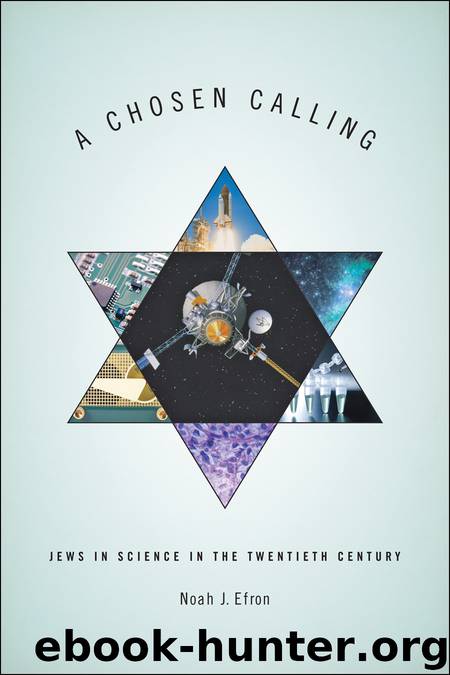A Chosen Calling by Noah J. Efron

Author:Noah J. Efron
Language: eng
Format: epub
Publisher: Johns Hopkins University Press
Published: 2014-03-14T16:00:00+00:00
Science and Zionist Image and Identity
It was no coincidence that the pioneer-scientist was a hero to kids caught up in the drama of building a Jewish homeland; the fact was that science and technology fit snuggly with the way many Zionists saw themselves and wished to be seen by others in Palestine and throughout the world.
Science and technology helped establish Jewish title to the land, sometimes explicitly (as by archeologists who documented generation after generation of Jewish hold on the land, reaching in an unbroken chain back to Joshua in Jericho), and sometimes through a more complicated chain of reasoning. Science and technology made plain the notion that Jewish settlement of Palestine was, in the end, a Western project flush with Western ideals and committed to advancing those ideals in the East.
In The Land of Promise, Jewish-Polish director Juda Leman brought this notion to life on the screen. Doleful images of local Arabs threshing with stone tools and roughly harnessed beasts, then eating and praying, open the film. After the ancient Jews were exiled from Palestine, the narrator explains, “primitive life returned.” In Jerusalem, “the streets and bazaars of the old city are the same today as they were in the Middle Ages.” A song plays over the opening credits, with lyrics by Natan Alterman, perhaps the greatest poet of Jewish mandatory Palestine: “A humiliated land, a god-forsaken land,/Sand and camels, sea and malaria,/Who knows why / It is so sad and pitiful?” Presently, the film shifts to Jewish settlers, working, employing boring machines to drill for water, laying telegraph and telephone cable, using tractors to clear fields and prepare roads. “With the most modern machinery,” the narrator says, “the Jews are bringing Palestine back to its long-neglected fruitfulness.”79 The film also introduced another poem by Alterman, commissioned by the director. Called “Morning Song,” it contained a paean to the sort of “progress” the film worshipped above all: “We love you, our Homeland … / We will dress you in a gown of concrete and cement.”80
As the film toured Europe and America to great acclaim (winning, for instance, the Jury Prize in the Venice Film Festival), this message did not escape notice. “First, the film presents specimens of stubbornly non-progressive Arabs, living in medieval filth and ignorance, unaware of the potential riches in the arid soil beneath their feet,” wrote a reviewer in the Baltimore Sun: “Then, in vivid contrast, one sees how the returning Jews, with up-to-date engineering methods and means of production, have transformed barren lands into fertile vineyards, olive and orange groves and fields of abundant grain. Next the infant industries are shown. … There are glimpses of such interesting institutions as the national bank operated for public and not private profit, the Hebrew University and its symphony orchestra, … and the lively modern city.”81
Much the same message was the point of the Jewish Palestine Pavilion for the 1939 New York World’s Fair. The plan, one of the organizers wrote, was to emphasize “the transformation of the
Download
This site does not store any files on its server. We only index and link to content provided by other sites. Please contact the content providers to delete copyright contents if any and email us, we'll remove relevant links or contents immediately.
| Africa | Americas |
| Arctic & Antarctica | Asia |
| Australia & Oceania | Europe |
| Middle East | Russia |
| United States | World |
| Ancient Civilizations | Military |
| Historical Study & Educational Resources |
A Tale of Love and Darkness by Amos Oz(1021)
Remember Us by Martin Small(971)
Aimee & Jaguar by Erica Fischer(959)
When Time Stopped by Ariana Neumann(957)
Alex's Wake by Martin Goldsmith(942)
The Betrayal of the Duchess by Maurice Samuels(916)
The Invention of the Jewish People by Shlomo Sand(845)
Genius & Anxiety by Norman Lebrecht(804)
A Chosen Few by Mark Kurlansky(783)
Roosevelt and the Holocaust by Robert L. Beir(713)
The Warburgs by Ron Chernow(709)
East West Street: On the Origins of "Genocide" and "Crimes Against Humanity by Philippe Sands(701)
Angel of Auschwitz by Tarra Light(689)
The Aleppo Codex: A True Story of Obsession, Faith, and the Pursuit of an Ancient Bible by Matti Friedman(680)
Nazi Germany and the Jews, Volume 01: The Years of Persecution by Saul Friedlander(674)
Genius and Anxiety by Norman Lebrecht(641)
The Scandal of Kabbalah by Dweck Yaacob(625)
Complete Works of Josephus by Josephus(622)
The Kosher Capones by Kraus Joe;(619)
